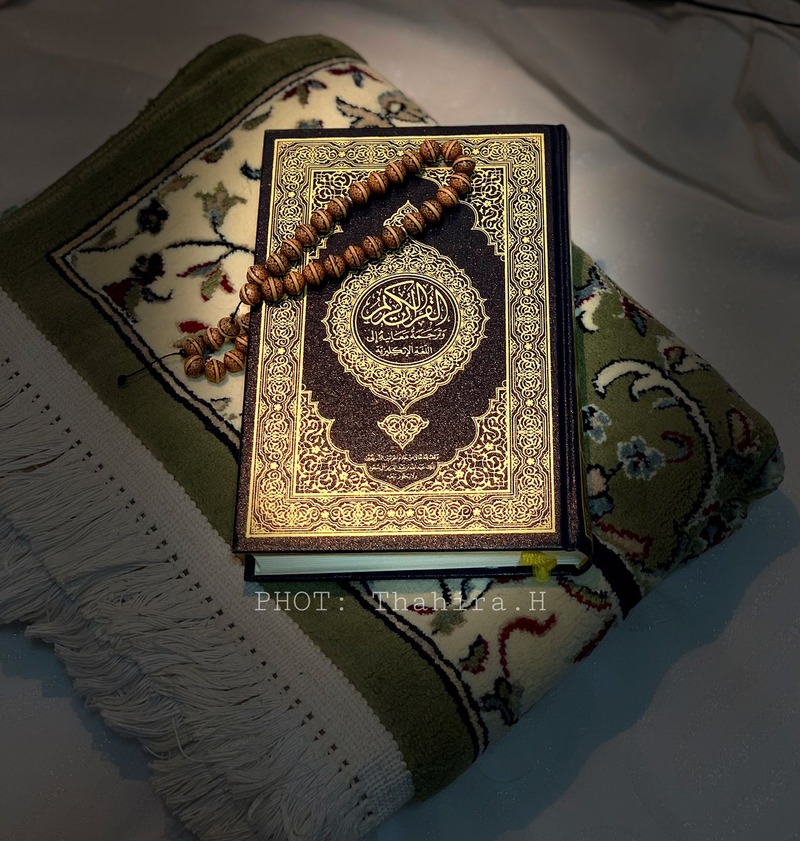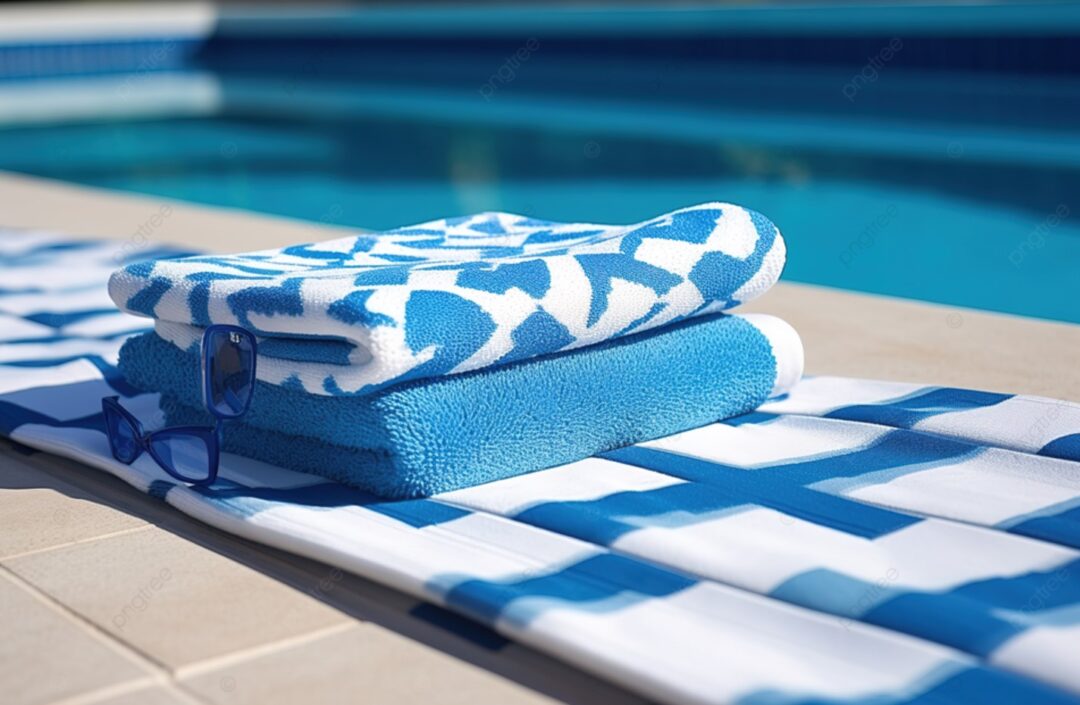
One day, a Muslim woman wrote me an email to ask if Islam permits women to wear a towel on their heads as an Islamic head cover (Hijab).
She explained that she was going on vacation with her family and wanted to know if she could use a towel substituting her usual Islamic headcover (Hijab) around the hotel, swimming pool, hot baths etc.
It was an unusual request, and I was unsure how to answer it, so I researched the issue to find out.
Here is what I discovered.
By Authors Maryam Hussain and Mohammed Francis
Table of Contents
(Click on the link to jump to the section and the arrow to get back)
- 1. Women Can Wear A Towel (Hijab) Provided She Covers Sufficiently
- 2. Evidence Towelling Is Permissible Female Dress (Hijab)
- 3. Evidence In The Holy Quran
- 4. Evidence From The Life of Prophet Mohammed (SAW) – Sunnah
- 5. Situations Where Women May Wear Towelling Material As A Headcover (Hijab)
- 6. Conclusion
- 7. Related Questions
- 8. References and Useful Links
So, Can Muslim Women Wear A Towel As A Head Cover (Hijab)?
Islam permits Muslim women to wear a towel as a substitute head cover (Hijab) provided it covers their bodies entirely from head to foot, except for the face and hands (Awrah). It must be loose-fitting and non-hugging. However, wearing towels in this way is often unusual and socially unacceptable.
After some thought, I agree that using a towel as a headcover (Hijab) may sometimes be necessary in public.
For example, at home, there are moments when women need to answer the doorbell quickly, move from the spa or swimming pool to their hotel rooms or go about their homes in the presence of unrelated (Non-Mahram) men.
Since wearing a towel as a headcover (Hijab) is permissible, why do we not usually see women wearing towels instead of the traditional headcover (Hijab) in public places?
In this article, I will explain how towelling meets the requirements for wearing the Islamic headcover (Hijab), where women may sometimes wear it, even though it is not suitable or a practical dress option.
1.Women Can Wear A Towel (Hijab) Provided She Covers Sufficiently
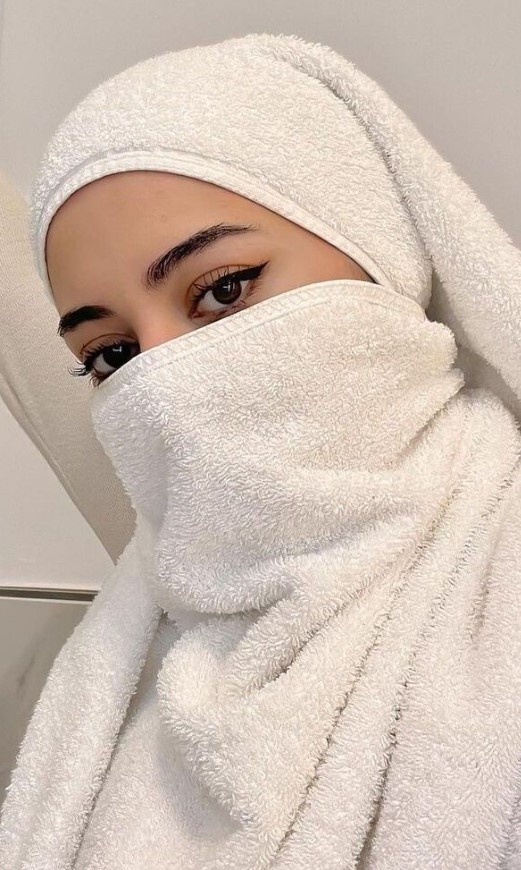
In certain circumstances, Islam permits women to use a towelling as a temporary headcover (Hijab) in front of unrelated (Non-Mahram) men provided the towelling material and any other forms of loose clothing she wears with it (Khimar), cover her entire body from head to toe, except for face and hands (Awrah).
Additionally, some scholars like Shaikh Muhammad Uthaymeen (HA) and Shaikh Saleh Al Fawzan (HA) maintain that a woman must also cover her face as they consider that to be Awrah.
So, if a woman can keep a thick towel in place over her body and her face without accidentally revealing herself or causing unnecessary discomfort, then Islam permits its use.
2. Evidence Towelling Is Permissible Female Dress (Hijab)
3. Evidence In The Holy Quran
A headcover (Hijab) made of towelling is acceptable in Islam since it fully complies with the conditions of correct female attire, but only if a woman wears it correctly.
Plenty of Quranic and Hadith evidence exists to include the sayings of the Prophet’s companions (Sahaba). It indicates how Islam obliges all Muslim women to cover their bodies completely, including the eyes, in front of male non-relatives (Non-Mahram).
Wearing one towel or multiple towels over the head and body women will achieve this.
Scholars use the following verse of Allah (SWT) in the Holy Quran to make rulings (Fatwa) concerning proper attire for Muslim females. In the blessed Holy Quran, Surah Al Noor 23:31, Allah (SWT) commands Muslim women to:
lower their gaze, guard their virginity, and not reveal their adornments except what usually appears or is apparent.
Surah Al Noor 23:31
Here, in this verse, Allah (SWT) demands women keep their bodies and how they beautify them covered up.
Later in the same verse, Allah (SWT) says covering up must happen in front of unrelated men (Non-Mahram). For fathers, brothers, uncles and close male family members, a woman may display her physical beauty in the usual way.
After Allah (SWT) had revealed Surah Al Noor 23:31 to the women of Ansari men (wives, daughters, sisters, etc), they understood it well. Hearing the freshly revealed verse from their husbands, some quickly untied their waist belts, and others made large shawls or cover sheets.
The following morning, the women began to offer their prayers (Salat) with Prophet Mohammed (SAW), and the (new) shawls covering them made it look like crows were sitting on their heads.
Employing this Quranic verse as clear evidence, all Muslim scholars agree that women should cover themselves entirely in public places from head to toe.
Convincingly, some scholars even include covering the face.
If women cover the head (Hijab) and dress to cover the hair, neck, shoulders and breast area in a loose, flowing and unrevealing way, then towelling material completely satisfies these conditions.
4. Evidence From The Life of Prophet Mohammed (SAW) – Sunnah
Once, someone asked the opinion of the famous companion, Ibn Abbas (RA) about the following Quranic verse instructing Prophet Mohammed’s (SAW) wives, daughters and Muslim women how to dress.
O Prophet! Ask your wives, daughters, and believing women to draw cloaks over their bodies.
Al Azhab 33:59
In the verse, Allah (SWT) informs women to draw their cloaks (Jilbab) loosely over themselves to distinguish them in their appearance from the women of the time of ignorance (Jahiliyyah) and from the slave women.
Demonstrating how to wear it, Ibn Abbas (RA) showed others by drawing the cloak (Jilbab) over himself, covering his body and face, and revealing only one eye and leaving it uncovered. Commentaries on Al Azhab 33:59
5. Situations Where Women May Wear Towelling Material As A Headcover (Hijab)
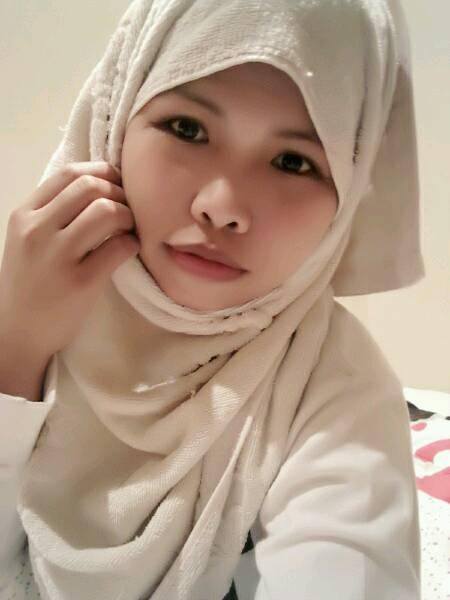
Now we know it is Islamically correct for Muslim women to wear towels on their heads (Hijab) and to cover their bodies completely (Awrah).
It may be correct to wear them, but putting thick towelling material on your head and over the face is not a great fashion choice. Other materials like nylon, polyester and crepe do the job much better.
Such materials are lighter, more elegant, and better suited for use as an Islamically compliant headcover (Hijab).
Of course, towelling is very colourful, thick, absorbent and suitable material for drying off, but not for the cat-walk.
A: In The Home – No Headcover Necessary Except With Strangers
At home, there is no need for a woman to cover the body or head out of modesty in the presence of close male relatives such as fathers, brothers and uncles. (Mahram)
However, if adult male visitors are present, she MUST dress in proper Islamic attire.
In this case, Islam permits a woman to temporarily wear a towel over her head (Hijab), across her face (Niqab) and a bathrobe or a loosely hanging bath towel to cover the body (Jilbaab). Then, she can move about the home and remain in full view of non-related men (non-Mahram).
B: Emergencies In The Home – A Headcover Required
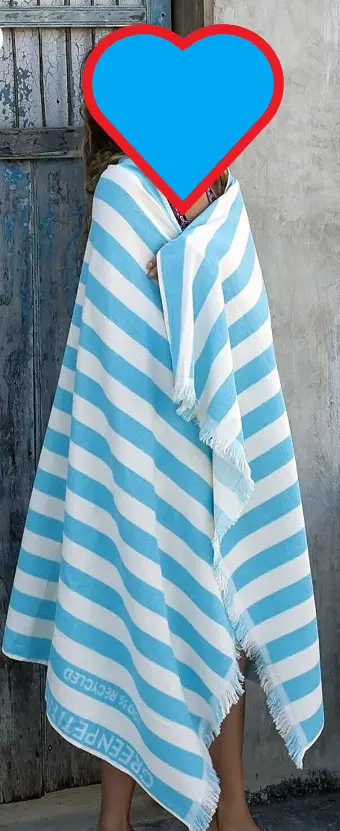
Similarly, a Muslim woman may place a large towel on her head (Hijab), raising it to cover the face (Niqab) to appear at the main door to accept mail deliveries or allow family members to enter the home.
Islam also allows women to wear a towel as a headcover (Hijab) to open and close windows, run errands outside in the garden, clean the yard, collect the dry washing, etc.
In my home country, when there is a lot of rain, I keep a large towel handy to quickly throw over myself if I have to pop outside into the garden to do household chores.
In my case, a simple long towel works well and is better and more convenient than an umbrella or a raincoat. It is a temporary solution but ideal for doing quick jobs around the house.
C: Outdoor Emergencies – A Headcover Required

Women will likely keep an umbrella handy than a towel when it rains heavily.
However, in a heavy downpour, she can shield her head and upper body from the deluge using a large towel (s) if available.
Likewise, a woman may lose her normal headcover (Hijab), or it may rip or become soiled. In this case, Islam permits her to put on towelling as a temporary measure.
D: In Prayer (Salat) – A Headcover Essential
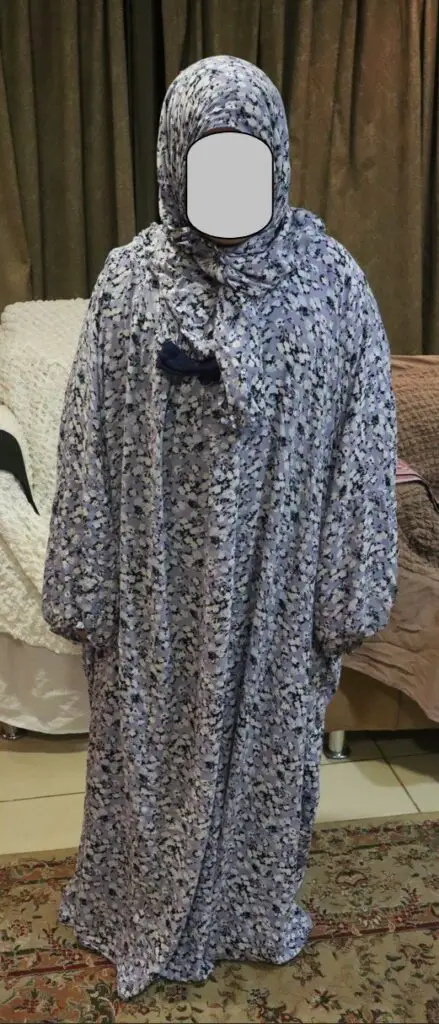
When a woman offers prayers (Salat), Islam permits her to use a towel as a headcover (Hijab) if it is wide enough to cover her head, neck, and the entire length of her torso and legs.
However, large, colourful beach towels are cumbersome and difficult to secure on the head and body. So, for the prayers at home (Salat), most women today use a specially designed billowing prayer gown with a hood and convenient sleeves.
The prayer gown consists of thin, light nylon material and is easy to wear, a practical alternative to the conventional cloaks (Jilbab) and headcovers (Hijab).
No matter the place, a woman must fully cover herself when praying at home, in the mosque, or public prayer rooms.
If she uncovers any part of herself, other than her face and hands, during the prayer, it becomes invalid, and she must repeat it.
E: At The Pool, Beach – A Headcover Is Essential
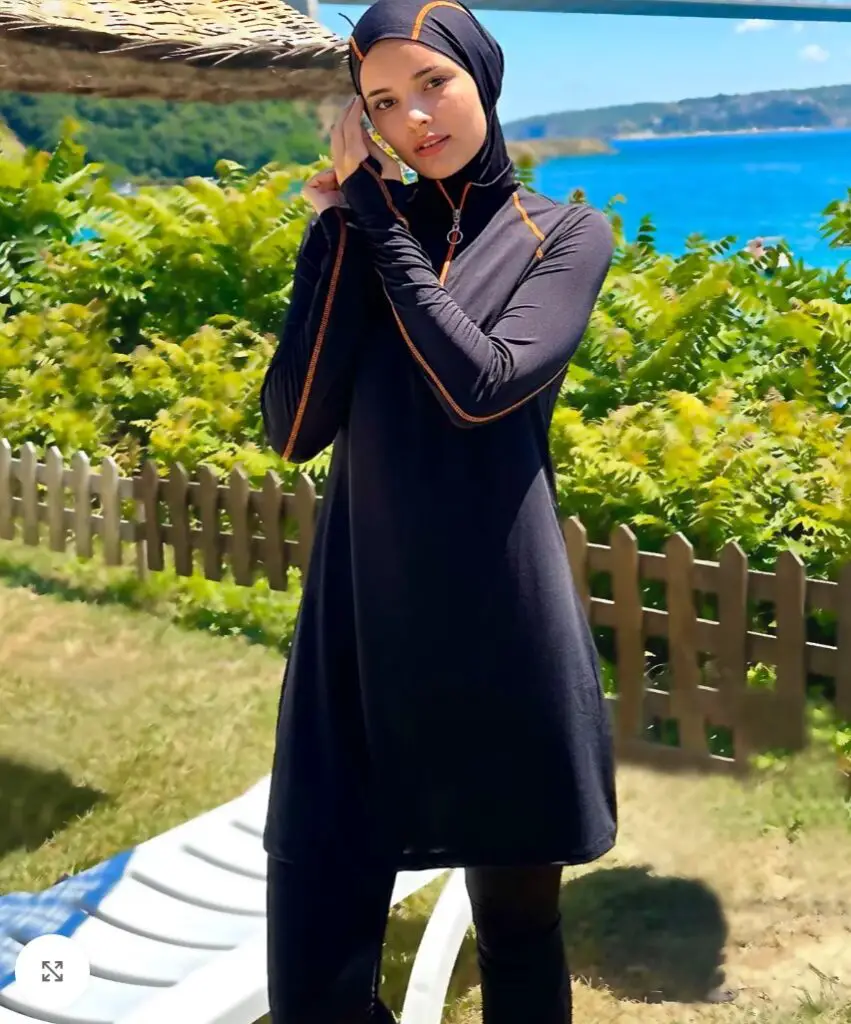
In mixed-gender swimming pools, public beaches, at spas, saunas, hairdressers or beauty salons. etc, women cannot reasonably wear conventional headcovers (Hijab) made of synthetic materials.
So, in the pool or beach, women wearing a Burkini is much better than other types of female swimwear because it is far less revealing.
However, even this (dreadful) so-called Islamic alternative does a poor job of covering the head and torso for it to be Islamically compliant.
The synthetic material of a Burkini is stretchy and clingy. When wet, it sucks and sticks tightly onto the body, clearly showing off the physical contours and intimate body parts.
If you MUST wear one, please cover your head and body entirely with a large towel before you enter and after you leave the water.
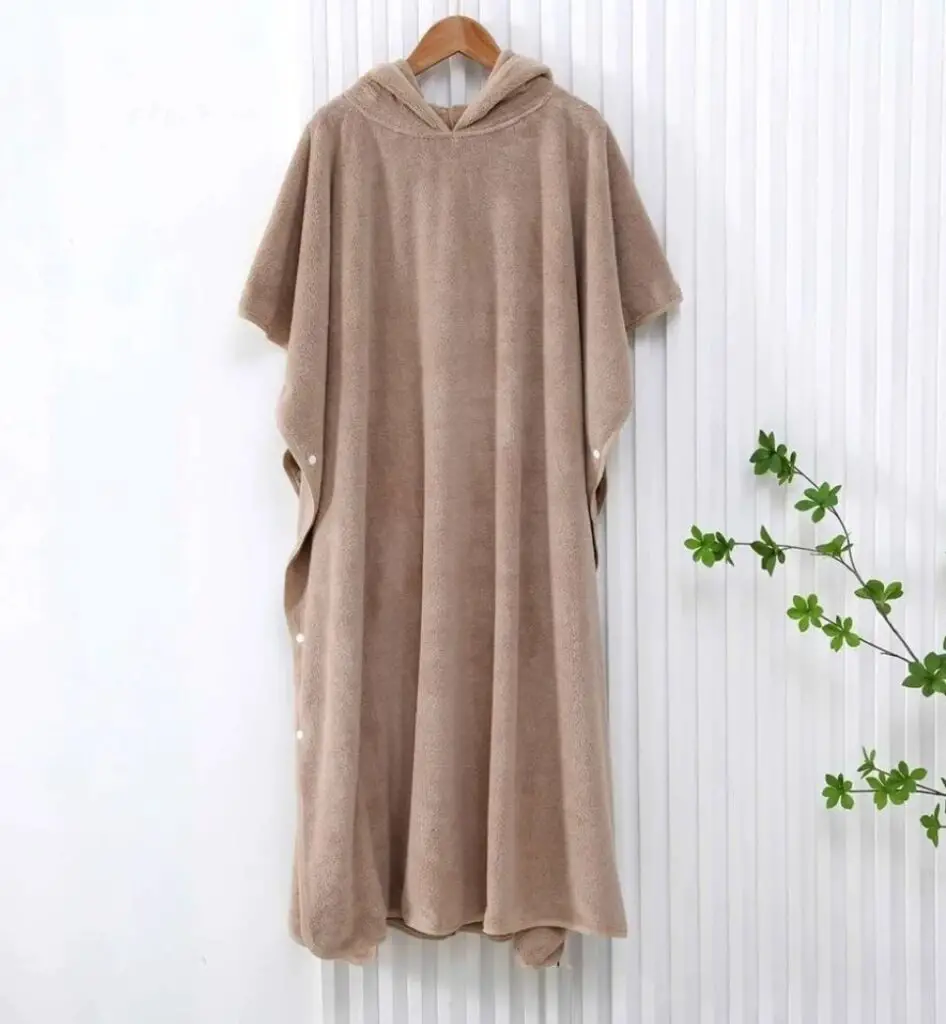
Drape a large, plainly coloured beach towel over your head and let it hang around your torso and legs as you move between the pool, sea or showers to your seating area.
Immersed in water, men cannot easily see women swimming and moving about. However, as you climb up the ladder to exit the pool or the sea, the residual water will cause the material to cling tightly to your body, thus exposing all your intimate parts in detail for all the world to see.
You can avoid this by placing a wide enough beach towel on a plastic chair next to the pool or on the seaside beforehand. Better, you can have someone hand it to you immediately after you exit the water.
F: At Female ONLY Spas, Saunas, Hairdressers & Beauty Salons – No Headcover Required

Thankfully, in the Muslim world, at least, spas, saunas, hairdressers and beauty salons are mostly male-free environments.
Only female staff serve these establishments, so naturally, in the absence of men, Islam does not obligate women to wear a cloak (Jilbab / Abaya) or headcover (Hijab).
For obvious reasons, I strongly discourage my Muslim sisters from taking hairdresser appointments with male hair stylists or male-run beauty parlours, even if they have excellent reputations.
Also, if after a spa or sauna, you have to keep a towel wrapped around your hair to dry it and need to step outside or get to your car to drive home, keep a larger-than-usual piece of suitable material and use that to cover yourself.
6. Conclusion

Islam permits using a towel as a head cover (Hijab) as long as it covers the entire body and includes the hair, head, neck, shoulders, torso, and feet (Awrah). Some scholars even argue that she must also cover her face and hands.
The towel or combination of towels should hang loosely over the head and the body and extend to the floor. She should not secure the towelling so tightly that it hugs the body.
During prayers (Salat), a woman can use a towel as a head cover (Hijab), though it is not ideal. She should always make sure to cover her hair and body as she offers the five daily prayers.
At home, her close male family members do not require a woman to wear a headcover (Hijab) unless unrelated male visitors are present, in which case she can wear a substitute towel (Hijab) as she moves about the house.
At the swimming pool, the beach, the sauna, spa, clubs, hairdressers and beauty salons, to do quick chores, and in emergencies a woman may use a towel as a temporary substitute headcover (Hijab).
7. Related Questions
Does Islam Allow Women To Expose Their Necks While Wearing a Headcover (Hijab)? No! Islam prohibits women from showing their necks to unrelated (non-Mahram) men). The type of head cover (Hijab) should be large enough to completely cover the head, hair, neck, shoulders and upper torso. Nothing of the body should show except the face and hands.
Can Muslim Women Show The Hairline and Ears While Wearing A Headcover (Hijab)? No! In some Muslim countries, women like to show some hairline by positioning the headcover (Hijab) higher up on the crown. Some also prefer to tuck it over the ears and expose them. Islam prohibits these fashion statements.
8. References and Useful Links
Is Niqab Compulsory? – Islam Q&A
Is Covering the Face Obligatory? – Islam Q&A
Tell the believing women to lower their gaze and not reveal their adornments – Quran 24:31
O Prophet! Ask your wives, …….draw their cloaks ….bodies – Quran Al Azab 33:59
Commentaries (Tafsir) On Surah Al Azab (33.59) – Quranx.com
Brief Life Story of Abdullah Ibn Abbas (RA) -Islamic Finder
The Importance of Proper Coverage During Prayers (Salat) – Aliftaa.jo
- Word Count: 2,191 words
- Grammarly Score: 100%
- Fog Index: 14.58 (college student reading level)

